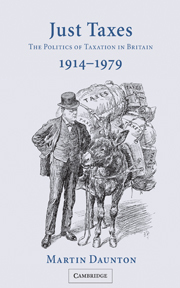Book contents
- Frontmatter
- Contents
- List of figures
- List of tables
- Preface
- List of abbreviations
- 1 The taxing state: an introduction
- 2 ‘The limits of our taxable capacity’: war finance, 1914–1918
- 3 ‘This hideous war memorial’: debt and taxation, 1918–1925
- 4 ‘Adjusting the particular turns of the different screws’: reforming the income tax, 1920–1929
- 5 ‘The great conflict of modern politics’: redistribution, depression and appeasement, 1929–1939
- 6 ‘The exigency of war’: taxation and the Second World War, 1939–1945
- 7 ‘The mortal blows of taxation’: Labour and reconstruction, 1945–1951
- 8 ‘A most injurious disincentive in our economic system’: Conservatives and taxation, 1951–1964
- 9 ‘Modern and dynamic economic policy’: Labour and taxation, 1951–1970
- 10 Rethinking taxation policy: from an opportunity state to an enterprise society, 1964–1979
- 11 ‘Highly defensible ramparts’: the politics of local taxation
- 12 Conclusion
- Appendix: chancellors of the Exchequer and prime ministers, 1908–1983
- Bibliography
- Index
5 - ‘The great conflict of modern politics’: redistribution, depression and appeasement, 1929–1939
Published online by Cambridge University Press: 23 December 2009
- Frontmatter
- Contents
- List of figures
- List of tables
- Preface
- List of abbreviations
- 1 The taxing state: an introduction
- 2 ‘The limits of our taxable capacity’: war finance, 1914–1918
- 3 ‘This hideous war memorial’: debt and taxation, 1918–1925
- 4 ‘Adjusting the particular turns of the different screws’: reforming the income tax, 1920–1929
- 5 ‘The great conflict of modern politics’: redistribution, depression and appeasement, 1929–1939
- 6 ‘The exigency of war’: taxation and the Second World War, 1939–1945
- 7 ‘The mortal blows of taxation’: Labour and reconstruction, 1945–1951
- 8 ‘A most injurious disincentive in our economic system’: Conservatives and taxation, 1951–1964
- 9 ‘Modern and dynamic economic policy’: Labour and taxation, 1951–1970
- 10 Rethinking taxation policy: from an opportunity state to an enterprise society, 1964–1979
- 11 ‘Highly defensible ramparts’: the politics of local taxation
- 12 Conclusion
- Appendix: chancellors of the Exchequer and prime ministers, 1908–1983
- Bibliography
- Index
Summary
To spend liberally upon services which release new energies and cultivate powers hitherto not fully used is, not extravagance, but economy. To permit a small group of rich men to appropriate, for such purposes as they deem most conducive to their own interests, the wealth without which the elementary needs of the community must be starved is, not economy, but extravagance.
Labour Party, Labour and the Nation: Statement of the Labour Policy and Programme (London, 1928), p. 37Despite Churchill's creative use of the fiscal and welfare systems, the Conservatives did not secure a majority in the general election of 1929, and Labour formed its second minority administration. The Conservative slogan in the elections was ‘safety first’, an appeal to orderly reform and stability as a basis of economic recovery. By contrast, Lloyd George and the Liberals fought on a radical programme of public works and economic reform – We Can Conquer Unemployment (London, 1929). The traumas of the general and miners' strikes, the difficulties created by the return to gold and the persistence of unemployment seemed to contradict the Conservative claims, yet without convincing the electorate of the desirability of Lloyd George's panacea. The question was: how would the new Labour administration react as economic recovery faltered after 1929, and the country moved into financial crisis and slump in 1931?
- Type
- Chapter
- Information
- Just TaxesThe Politics of Taxation in Britain, 1914–1979, pp. 142 - 175Publisher: Cambridge University PressPrint publication year: 2002



